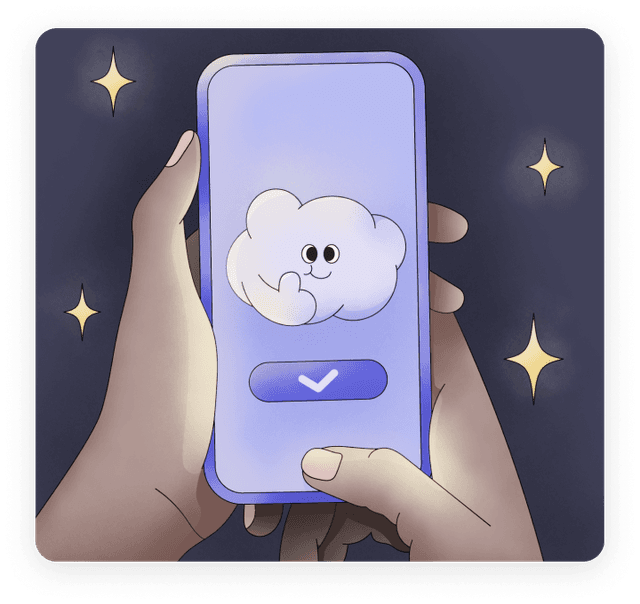
Denys Chumak
19 Jul 2023
How to Lucid Dream? Tips and Steps
Have you ever wished you could control your dreams? Imagine being able to fly through the sky, explore new worlds, or meet your favorite celebrities, all within the realm of your subconscious mind. Lucid dreaming offers you exactly that - the ability to become aware and take charge of your dreams.
Lucid dreaming is an incredible phenomenon where you can be fully conscious and in control of your dreams. It allows you to shape your dreamscapes and experience things beyond the limitations of the waking world.
In a recent publication in Current Biology, researchers demonstrate that individuals who experience lucid dreaming have the ability to understand and communicate intricate messages with the real world while in their dream state. Interesting, isn’t it?
So, let's dive into some practical tips on how to lucid dream and how to control lucid dreams.
What is Lucid Dreaming?
Lucid dreaming is the state of being aware that you are dreaming while you are still in the dream itself. In this unique state of consciousness, you have the power to actively participate in and manipulate the events of your dream. Lucid dreams can be incredibly vivid and lifelike, allowing you to engage in adventures and experiences that would be impossible in the waking world.
5 Tips to Lucid Dream
Now, that you have understood the concept of lucid dreaming, let's explore some practical tips to lucid dream:
Keep a Dream Journal:
Start by keeping a dream journal beside your bed. As soon as you wake up, record your dreams in as much detail as possible. This practise increases your dream recall ability and helps you recognise patterns and triggers that may occur in your dreams, ultimately aiding in lucidity.
Reality Checks:
Incorporate reality checks into your daily routine. Perform simple actions throughout the day, such as looking at your hands, checking the time, or attempting to push your finger through your palm. These checks help create a habit of questioning reality, which can carry over into your dreams, increasing the likelihood of becoming lucid.
Set an Intention:
Before going to sleep, set a clear intention to become lucid in your dreams. Repeat affirmations like "I will have a lucid dream tonight" or visualise yourself recognising a dream. Planting this intention in your mind enhances your focus and increases your chances of achieving lucidity.
Also Read: What Does It Mean When You Dream About The Devil?
Wake-Back-to-Bed Technique:
This technique involves waking up after 4-5 hours of sleep and staying awake for a short period before going back to bed. Use this time to read about lucid dreaming or engage in activities that stimulate your mind. When you go back to sleep, you're more likely to enter a dream directly, making it easier to become lucid.
Mnemonic Induction of Lucid Dreams (MILD):
Before falling asleep, repeat a mantra or affirmation, such as "Next time I'm dreaming, I will remember I'm dreaming." Visualise yourself becoming lucid while fully experiencing the emotions and sensations associated with it. This technique helps reinforce the intention of lucidity in your dreams.
How to Lucid Dream?
Now that you have some tips, let's explore lucid dream steps to help you control your dreams:
Stabilise Your Dream:
Once you become lucid, it's important to stabilise the dream to prevent it from fading or abruptly ending. Engage your senses by touching objects, feeling textures, or focusing on the details of your surroundings. This sensory immersion anchor you in the dream and prolongs the experience.
Experiment and Explore:
Take advantage of your lucid state to experiment with different actions and experiences. Fly through the sky, visit exotic locations, or summon characters or objects of your choice. The possibilities are endless, limited only by your imagination. Embrace the freedom and embrace the limitless potential of your lucid dreams.
Practise Dream Control:
With experience, you can learn to exert more control over your dreams. Experiment with manipulating the dream environment, changing objects, or summoning people. Practise visualisation and willpower to shape the dream according to your desires. Remember, confidence and belief in your abilities are key to exerting control.
Engage Your Senses:
Pay attention to the sensory aspects of your lucid dreams. Feel the wind on your face, taste the food, and immerse yourself in the rich details of the dream world. By engaging your senses, you enhance the realism and intensity of the experience, making it even more fulfilling.
Also Read: What Do Work Anxiety Dreams Mean?
Reflect and Learn:
After each lucid dream, take some time to reflect on the experience. Consider what worked well and what you would like to improve. This reflection helps you learn more about your dreams and aids in future lucid dreaming endeavours.
Ways to Induce a Lucid Dream
Here are some steps that can improve your chances of having a lucid dream:
Improve Your REM Sleep:
If you want to enhance the quality of your sleep, it's essential to work on your sleeping habits. This includes sticking to a consistent sleep schedule, avoiding electronic devices before bedtime, refraining from heavy meals and caffeine in the evening, and creating a relaxing sleep environment.
Create a Dream Diary:
Many people have found that keeping a diary can enhance their chances of experiencing lucid dreams. By actively recording and reflecting on their dreams, individuals can cultivate a greater awareness and focus on their dream experiences. By paying closer attention to them, you may become more aware of these moments when they occur.
Try Using the Mnemonic Induction of Lucid Dreams (MILD) Technique:
With this method, remind yourself repeatedly that you will dream and be conscious of it. Doing this can activate your prospective memory and encourage lucid dreaming.
Try Reality Testing
Reality testing involves assessing oneself in both waking and sleeping states to determine if one is dreaming. One possible method is to press your finger against the wall as a way to determine if you are dreaming or not. In the real world, your finger would stop upon contact with the wall, but in a dream, it might pass right through. Getting accustomed to performing reality tests while awake can help make them easier to do later when you're at your advantage of having Lucid Dreams.
Your waking life may benefit from lucid dreams in several ways, including the following:
Have less anxiety:
It's possible that the feeling of control you get during a lucid dream will last with you and give you a sense of empowerment. Knowing that you are in a dream allows you to control the dream's narrative and conclusion. People who suffer from nightmares might benefit from this as a kind of treatment since it would educate them on how to take control of their dreams.
Improved the ability to move:
By "practicing" during a lucid dream, it may be possible to improve simple things like tapping your fingers more quickly. However, just a few studies have been conducted on this topic. When you go through the motions in a lucid dream or envision them when you are awake, the same area of your brain becomes active when you do either.
Solving problems more effectively:
In their study, the researchers discovered evidence that lucid dreaming may assist individuals in solving issues involving creativity (such as a disagreement with another person) rather than difficulties that require logic (such as a mathematical problem).
Extra creative effort:
Due to their participation in lucid dream research, some individuals could generate novel concepts or fresh perspectives, sometimes with the assistance of characters in their dreams.
Also read: Six Interpretations of Water as a Dream Symbol
Potential Pitfalls of Lucid Dreaming
Many things could affect whether or not you have transparent dreams, some of which could be psychologically helpful and others harmful. Here are some things to remember:
Harmful effects on mental health:
Some study suggests that conscious thinking may be wrong for your mental health. According to one study, people who have more vivid conscious dreams are more likely to show signs of disorder. Also, the methods used to make these thoughts happen might have long-term effects, like making it more likely that someone will have sleep problems, sadness, or dissociation.
Interruption of sleep:
Lucid dreams can be so detailed and intense that they can wake you up. Some ways to get them to do something also involve purposely stopping it. For example, MILD works best if the person wakes up 30 to 120 minutes at night and then falls asleep. These practices might help you have transparent dreams, but they might also harm your mental health and well-being.
Your attitude might be critical:
Researchers have found a link between lucid dreaming and psychological traits like the internal center of control and the need for cognition/creativity. Lucid dreamers also score better on the need for cognition/creativity tests. Another study found tiny links between lucid dreams and being open to new experiences, one of the Big Five psychological traits. A study found that lucid dreamers tend to have a higher internal locus of control and do better on tests of need and creativity.
Another study found links between lucid dreaming and certain personality traits, with openness to experience being linked in some way with certain personality traits linked with it in terms of being. There is no promise that a clear dream will happen, but there are things that can be done to make it more likely.
Conclusion
Lucid dreaming is a truly remarkable phenomenon that allows you to tap into the depths of your imagination and consciousness. By implementing the tips and steps outlined in this article, you can embark on a journey of self-discovery, adventure, and personal growth through the world of lucid dreaming.
With DreamApp, you could experience incredible adventures while you sleep. This unique app aims to assist you in delving into the depths of your subconscious and harnessing the potential of lucid dreaming. Not just lucid dreaming, but DreamApp helps you unravel the hidden messages in your dreams by interpreting them.
Remember, practise, patience, and a curious mindset are key to unlocking the full potential of your dreams. Sweet dreams and happy lucid dreaming!
Frequently Asked Questions
How can I prolong the duration of my lucid dreams?
To prolong the duration of lucid dreams, you can try rubbing your hands together or engaging in activities that maintain mental engagement and prevent passive observation, such as interacting with dream characters, exploring the dream environment, or performing complex tasks.
Are there any supplements or herbs that can aid in lucid dreaming?
Some supplements or herbs are believed to aid in lucid dreaming, although scientific evidence is limited. Substances such as galantamine, choline, or vitamin B6 have been reported to potentially enhance dream vividness and the likelihood of lucid dreaming. However, it's important to exercise caution when considering supplements and consult with a healthcare professional before use.
How can I stay focused and maintain lucidity within a dream?
To stay focused and maintain lucidity within a dream, you can use verbal commands or affirmations to stabilise and reinforce your lucidity. And you should avoid becoming too excited or emotionally overwhelmed, as this can destabilise the dream.
Can lucid dreaming have any impact on the quality of my sleep?
Lucid dreaming can have some impact on the quality of your sleep, particularly if you become too focused on lucid dreaming to the extent that it disrupts your regular sleep patterns. It is important to prioritise overall sleep health, maintain a consistent sleep schedule, and ensure that you are getting sufficient sleep for your well-being. Balancing the pursuit of lucid dreaming with maintaining healthy sleep habits is crucial for overall sleep quality.
Did you have an unusual dream with this symbol?
Let's analyze this dream with our expert!
At least five words, please.

Your dreams are completely private
Take control of your dream emotions in the free mobile app



The most recent users' dreams
Go to the user dreams page
Dream App
Free dream interpretations

(1,213)











